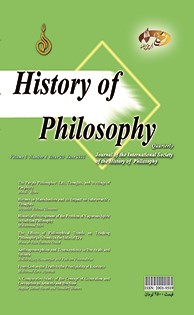Anthropomorphism and Transcendence in Ibn Arabi and Spinoza
Subject Areas : Connection of philosophers’ views and philosophical schools with the social and philosophical conditions of the timeAbdulrazzaq Hessamifar 1 , Pedram Pourmehran 2
1 - دانشگاه بينالمللی امامخمينی(ره)
2 -
Abstract :
Anthropomorphism and transcendence are related to the quality of Man’s perception of Divine Names and Attributes. The roots of this discussion can be traced back in divine revelation and holy books. In the world of Islam, the anthropomorphic and transcendental verses of the Qur’an have provided the context for several discussions among Muslim mutikallimun. During the Christian Middle Ages, the Holy Book and the thoughts of the philosophers of that period concerning affirmative and negative methods of knowing God promoted some debates about the Divine Attributes. Ibn Arabi and Spinoza are two philosophers from two different philosophical traditions: one is an intuitive gnosis and the other is a rationalist philosopher; however, both of them deal with the knowledge of God and His Names and Attributes based on a monistic approach. Moreover, both of them follow the same approach to anthropomorphism and transcendence and believe in them. In the present paper, the writers initially present the ideas of Ibn Arabi and Spinoza about anthropomorphism and transcendence and then proceed to analyze and compare them.
ابنعربي، محييالدين، فصوصالحکم، تصحيح ابوالعلاء عفيفي، تهران، انتشارات الزهرا، 1370. #
ابنعربي، محييالدين، کتابالمسائل، مجموعه رسائل ابنعربي، بيروت، دار احياء التراث العربي، 2 ج، 1367. #
اسپينوزا، باروخ، اخلاق، ترجمه محسن جهانگيري، تهران، مرکز نشر دانشگاهي، چ2، 1376. #
اسکروتن، راجر، اسپينوزا، ترجمه اسماعيل سعادت، تهران، انتشارات طرح نو، چ1، 1376. #
اولوداغ، سليمان، ابنعربي،ترجمه داوود وفايي، تهران، نشر مرکز، چ1، 1384. #
ايلخاني، محمد، تاريخ فلسفه در قرون وسطي و رنسانس، تهران، انتشارات سمت، چ1، 1382. #
پاکتچي، احمد، «اشاعره»، دايرة المعارف بزرگ اسلامي، تهران، مرکز دايرة المعارف بزرگ اسلامي، ج8، 1377. #
جهانگيري، محسن، مجموعه مقالات، تهران، انتشارات حکمت، چ1، 1383. #
جهانگيري، محسن، محييالدينابنعربي، تهران، انتشارات دانشگاه تهران، چ4، 1375. #
شمس، محمدجواد، تنزيه و تشبيه در مکتب ودانته و مکتب ابنعربي (بهمراه بررسي پيشينه¬ بحث در اسلام و دين ودايي)، قم، نشر اديان، 1389. #
قيصري رومي، محمدداوود، شرحفصوصالحکم، بکوشش سيدجلالالدين آشتياني، تهران، انتشارات علمي و فرهنگي، چ1، 1375. #
کاپلستون، فردريک، تاريخ فلسفه، ج2، ترجمه ابراهيم دادجو، تهران، انتشارات علمي و فرهنگي، چ2، 1388. #
ميشل، توماس، کلام مسيحي، ترجمه حسين توفيقي، قم، انتشارات دانشگاه اديان و مذاهب، چ3، 1387. #
ياسپرس، کارل، اسپينوزا، ترجمه محمدحسن لطفي، تهران، انتشارات طرح نو، چ2، 1378. #
Bennet, Janatan, “Spinoza’s Metaphysics” in The Cambridge Companion to Spinoza, ed. Don Garrett, New York: Cambridge University Press 1996. #
Descartes, Rene, The Philosophical Writings of Descartes, ed. and trans. John Cottingham, Robert Stoothoff, and Dugald Murdoch, 3 vols., Cambridge: Cambridge University Press 1985. #
Donagan, Alan, “Essence and the Distinction of Attributes” in Spinoza, A Collection of Critical Essays, ed. Marjorie Grene, Notre Dame, Indiana: University of Notre Dame Press 1973. #
Hick, John, God and the Universe of Faiths, Oxford: Oxford University Press 1993. #
Hubbeling, H. G., Spinoza’s Methodology, Assen: Royal VanGorcum Ltd (1967). #
Parchment, Steven, “The God /Attribute Distinction in Spinoza’s Metaphysics: A Defence of Causal Objectivism”, History of Philosophy Quarterly, vol. 13, no.1, pp. 55-72 1996. #
Wolfson, Harry Austryn, The Philosophy of Spinoza, 2 vols., Cambridge, Mass: Harvard University Press 1934. #
Woolhouse, Rogers, Descartes, Spinoza, Leibniz: The Concept of Substance in Seventeenth-Century Metaphysics, New York: Routledge 1993. #


